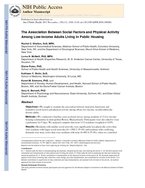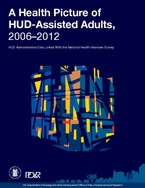0
Podcast
Community:
This podcast episode features the work of the Hunterdon County Partnership for Health, a multi-sector coalition that includes over 60 community agencies that share a common interest in improving health in Hunterdon County, NJ. Kim Blanda is a Project Director at Hunterdon Healthcare, Dr. Rose Puelle is a Senior Director of Population Health at Hunterdon Healthcare, and Karen DeMarco is the Director of the Hunterdon County Department of Health. Together, they are working on a project funded by New Jersey Health Initiatives (NJHI) focused on healthier weight as a mechanism for improving community health. The Partnership is addressing obesity-related social determinants of health related to access and transportation, mental health and healthy behaviors.
Authored by: All In: Data for Community Health
Topics: Data sharing, Health, Nutrition, Obesity, Partnerships
 Shared by Housing Is
Shared by Housing Is
Housing Is posted a
on Apr 8, 2019
All In: Data for Community Health
This podcast episode features the work of the Hunterdon County Partnership for Health, a multi-sector coalition that includes over 60 community agencies that share a common interest in improving health in Hunterdon County, NJ. Kim Blanda is a Project Director at Hunterdon Healthcare, Dr.
0
Publication
Community:
Sep 1, 2018
The firearm, obesity, and opioid epidemics are among the most important public health crises of our time. Each epidemic has a complex etiology that challenges efforts at mitigation. From this, a central question arises for researchers, clinicians, and policymakers: How can we identify what matters most within a broad range of causal factors in these epidemics, and can we draw cross-epidemic inferences that will help inform our thinking?
Authored by: Sandro Galea for Milbank Memorial Fund
Topics: Food insecurity, Health, Low-income, Nutrition, Obesity, Partnerships, Safety, Substance abuse
 Shared by Mica O'Brien
Shared by Mica O'Brien
Mica O'Brien posted a
on Jan 24, 2019
Sandro Galea for Milbank Memorial Fund
The firearm, obesity, and opioid epidemics are among the most important public health crises of our time. Each epidemic has a complex etiology that challenges efforts at mitigation.
0
Research
Community:
Nov 28, 2018
Public housing residents are more likely than urban residents not living in public housing to have high rates of obesity and smoking and low rates of physical activity. This study assesses whether adding environmental interventions at public housing developments affects residents’ health-related habits and body mass index.
Authored by: BMC Public Health
Topics: Exercise, Health, Housing, Low-income, Obesity, Research
 Shared by Mica O'Brien
Shared by Mica O'Brien
Mica O'Brien posted a
on Nov 29, 2018
Public housing residents are more likely than urban residents not living in public housing to have high rates of obesity and smoking and low rates of physical activity.
0
News Article
Community:
Jul 27, 2018
Health promotion interventions in public housing communities have the potential to reduce obesity among residents, a new study shows. Changes in their environment, such as fresh food trucks, walking groups, screenings, and cooking demos, helped Boston residents eat better and get more exercise.
Authored by: University of Washington School of Medicine
Topics: East Coast, Exercise, Food insecurity, Health, Housing, Low-income, Nutrition, Obesity, Research
 Shared by Housing Is
Shared by Housing Is
Housing Is posted a
on Jul 27, 2018
University of Washington School of Medicine
Health promotion interventions in public housing communities have the potential to reduce obesity among residents, a new study shows. Changes in their environment, such as fresh food trucks, walking groups, screenings, and cooking demos, helped Boston residents eat better and get more exercise.
0
Research
Community:
Jul 12, 2018
We sought to examine the association between structural, functional, and normative social factors and physical activity among urban, low-income, racially/ethnically diverse adults.
Authored by:
Topics: Exercise, Health, Housing, Low-income, Obesity, Research
 Shared by Housing Is
Shared by Housing Is
Housing Is posted a
on Jul 12, 2018
We sought to examine the association between structural, functional, and normative social factors and physical activity among urban, low-income, racially/ethnically diverse adults.
0
Case study
Community:
Jul 12, 2018
In Boston, Massachusetts, the Boston Housing Authority, Boston Public Health Commission, the city’s Inspectional Services Department, the Boston Foundation, and local universities and medical institutions have come together over the last decade-plus to address the intersection of health and housing. Motivated by a desire to improve the lives of Boston’s most vulnerable residents, these organizations began collaborating to address asthma and, more recently, to prioritize housing and health needs for pregnant women. By bridging anchor institutions, foundations, and city agencies around health and housing initiatives citywide, Boston has made strides toward providing healthier housing options and integrated health management and referral systems. This case study highlights how a variety of key stakeholders within one city can collaborate to address the health and housing needs of its vulnerable residents.
Authored by:
Topics: Asthma, Child welfare, Dual-generation, Early childhood, East Coast, Exercise, Family engagement, Funding, Health, Home visiting, Homelessness, Housing, Low-income, Medicaid / Medicare, Nutrition, Obesity, Partnerships, Pre-natal, Preventative care, Research, Smoke-free
 Shared by Housing Is
Shared by Housing Is
Housing Is posted a
on Jul 12, 2018
In Boston, Massachusetts, the Boston Housing Authority, Boston Public Health Commission, the city’s Inspectional Services Department, the Boston Foundation, and local universities and medical institutions have come together over the last decade-plus to address the intersection of health and housing.
0
Research
Community:
Jul 11, 2018
A Research Review and Comment on Future Directions for Integrating Housing and Health Services
Authored by:
Topics: Affordable Care Act, Cost effectiveness, Data sharing, Exercise, Health, Homelessness, Housing, Low-income, Medicaid / Medicare, Mental health, Metrics, Nutrition, Obesity, Partnerships, Preventative care, Research, Supportive housing
 Shared by Housing Is
Shared by Housing Is
Housing Is posted a
on Jul 11, 2018
A Research Review and Comment on Future Directions for Integrating Housing and Health Services
0
Webinar
Community:
Feb 21, 2018
Presentation from CLPHA's February 2018 Health Strategic Planning Workshop, co-facilitated with Health Impact Project and Grantmakers in Health
Authored by: CLPHA, Health Impact Project (Pew/RWJF), and Grantmakers in Health
Topics: Affordable Care Act, CLPHA, Community development, Data sharing, Health, Healthy homes, Homelessness, Housing, Medicaid / Medicare, Mental health, Obesity, Partnerships, Place-based, Research, Supportive housing, TA
 Shared by Steve Lucas
Shared by Steve Lucas
Steve Lucas posted a
on Feb 27, 2018
The 2018 CLPHA Health Strategic Planning Workshop, co-facilitated with Health Impact Project (a collaboration of Pew Charitable Trusts and Robert Wood Johnson Foundation) and Grantmakers in Health, convened over 35 communities across the country. Participating teams included internal PHA staff at member agencies who work on health-related initiatives as well as external partners that provide services, education, and other health resources for residents.
CLPHA, Health Impact Project (Pew/RWJF), and Grantmakers in Health
Presentation from CLPHA's February 2018 Health Strategic Planning Workshop, co-facilitated with Health Impact Project and Grantmakers in Health
0
Research
Community:
Jun 22, 2017
Unprecedented descriptive analysis linking HUD administrative data and results from the National Health Interview Survey (pre-Affordable Care Act)
Authored by:
Topics: Affordable Care Act, Cost effectiveness, Dental, Depression, Exercise, Health, Healthy homes, Housing, Medicaid / Medicare, Mental health, Nutrition, Obesity, Research, Seniors, Smoke-free, Substance abuse
 Shared by Steve Lucas
Shared by Steve Lucas
Steve Lucas posted a
on Jun 22, 2017
From the Office of Policy Development and Research (PD&R) at the U.S. Department of Housing and Urban Development:
Unprecedented descriptive analysis linking HUD administrative data and results from the National Health Interview Survey (pre-Affordable Care Act)
 Shared by Housing Is
on Apr 8, 2019
Shared by Housing Is
on Apr 8, 2019

 Shared by Housing Is
on Jul 27, 2018
Shared by Housing Is
on Jul 27, 2018

 Shared by Housing Is
on Jul 12, 2018
Shared by Housing Is
on Jul 12, 2018
 Shared by Housing Is
on Jul 12, 2018
Shared by Housing Is
on Jul 12, 2018
 Shared by Housing Is
on Jul 11, 2018
Shared by Housing Is
on Jul 11, 2018
 Shared by Steve Lucas
on Feb 27, 2018
Shared by Steve Lucas
on Feb 27, 2018
 Shared by Steve Lucas
on Jun 22, 2017
Shared by Steve Lucas
on Jun 22, 2017








